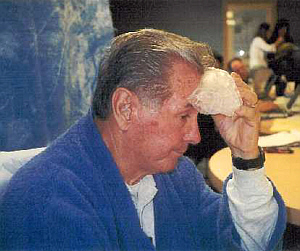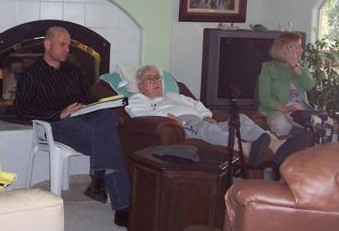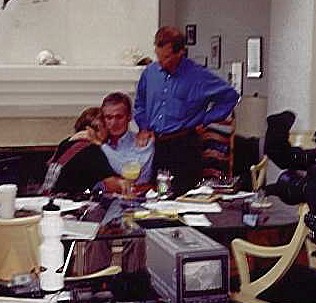Justice for a mesothelioma victim often depends on his deposition. The
patient, the defense lawyers, and our guys sit down together and videotape
the patient's testimony. We get a chance to ask questions, and the
bad guys then have a turn.
The procedure is fundamental to justice. The patient describes his exposure
to asbestos, we ask him questions to clarify key points, and the defense
then has a chance to poke holes in his story. Everybody gets a say, and
the jury can watch the videotape and make up their own mind as to which
story they believe.

Deposition of George LaChapelle
October 9, 2003
Huntington Beach, CA
But when does fair questioning become abuse? How much questioning is too
much? What's the difference between challenging someone's story
and physically trying to hurt them through extended, abusive, exhausting
harassment-especially when they may be struggling through the final painful
stages mesothelioma?
Makers of asbestos often capitalize on their victims' frailties by
making the questioning as drawn out as possible. The ensuing exhaustion
may impair the victim's ability to recall and effectively testify.
More sinister still, this strategy weakens the already frail victim and
can hasten his demise. The defendants literally have a financial incentive
to delay: California law, while fair in providing for early trials for
terminal patients, is manifestly unfair in barring the decedent's
estate from asking the jury to award damages for the pain, suffering,
anguish and bodily disfigurement.
There's an old saying among insurance defense lawyers in California:
If you run over a guy, check the rear view mirror. If he's still moving,
put it in reverse.
It's no secret that bad companies who kill instead of maiming their
victims get a windfall. The asbestos companies turned a cheap buck when
they poisoned the worker, and they save money a second time around by
manipulating the rules and dragging their feet long enough to avoid a
living personal injury plaintiff witness. They won't admit to that
on the record, but off the record they'll sheepishly admit they'd
be foolish not to engage in delay tactics.
Some states shield mesothelioma victims from abuse. Texas limits defense
questioning in asbestos cancer cases to six hours. The rules for cases
filed in federal court limit depositions to six hours. In California,
though, it's still open season on the weak, the sick, and the frail.
Roger Worthington has long advocated reasonable limitations on the length
of time that asbestos companies can grill their victims. The voice of
the patient and his advocate, however, have historically been shouted
down by the corporations that made and sold these poisonous products in
the first place.
We know that victims of asbestos cancer need to conserve their energy to
fight their disease, so we fight aggressively to limit abusive questioning.
Where possible we obtain court orders that limit the defense's abusive
strategy. Doctors who are committed to the well-being of their asbestos
cancer patients often help us with the declarations that judges need to
protect our clients from harassment.

Deposition of William Saller
January 31, 2006
Paso Robles, CA
California lets a judge enter orders "as justice requires" to
protect any party or person from "unwarranted annoyance, embarrassment
or oppression, or undue burden and expense." Harassment by defense
attorneys directly affects the health of an asbestos cancer victim. Harassment
comes in all forms, including tactics like "running out the clock"
by repeating the same tired questions, or going down rabbit holes that
lead nowhere.
In a recent declaration submitted for one of his patients, Dr. Robert Cameron
of the UCLA Geffen School of Medicine explained the relationship between
questioning and the health of an asbestos victim:
"Fatigue has been identified as significantly interfering with quality
of life in people of all ages who have cancer, regardless of diagnosis,
treatment, or prognosis. Although there are established medical interventions
for most cancer-related symptoms, there are only limited medical treatments
for fatigue. Physical and emotional stress both contribute to a cancer
patient's fatigue.
"Generally, fatigue becomes progressively worse as a malignancy progresses.
Fatigue can lower a cancer patient's concentration ability, which
can seriously affect the patient's capacity for learning, problem
solving, and performing even menial everyday tasks of living. The mental
storing and recalling of information, called memory, can be affected by
attentional fatigue and/or emotional or physical stress. Prolonged emotional
or physical stress can adversely interfere with memory and the ability
to focus meaningfully on tasks.
"A prolonged legal deposition over a period of days, in which the
cancer patient is daily subjected to hours of often repeated detailed
questions by dozens of lawyers regarding events that may have occurred
30 to 50 years ago, can increase the patient's stress level and exacerbate
fatigue, with its attendant negative consequences to the patient's
cognitive status and cancer fighting ability.
"In medicine, physicians are obligated to relieve suffering. If we
fail to do this, we are at risk for prosecution under the Older Americans
Act, which was reauthorized in 1992 with a new Title VII, Chapter 3 to
specifically prevent abuse, neglect and exploitation of the elderly (defined
as someone 60 years of age or older). If the failure to relieve suffering
itself is cause for legal action, then I have to wonder how this important
Act would view the discomfort, fatigue, and frank pain visited on a terminal
mesothelioma patient during the course of an unregulated, unlimited and
burdensome series of legal depositions. In my opinion, such an unlimited
deposition could and should be construed as unnecessary, cruel, unethical,
and inexcusable-something that certainly should be considered "elder
abuse" - especially if less intrusive means of obtaining a history
are available.
"Mesothelioma is regarded as one of the most painful tumors known
to man. In order to maintain any quality of life, it is essential that
the patient avoid undue and avoidable stress in order to maintain sufficient
strength and vigor to eat, breath, and continue fighting this horrific
disease."

Deposition of Thomas Hazen
July 10, 2000
San Clemente, CA
Many judges will conclude that unlimited defense questioning constitutes
oppression under the law and will impose strict limitations. However,
because there is no "hard and fast" rule that every judge is
required to apply consistently, the matter is left to each individual
judge's discretion. As a result, even under the same set of facts,
there are some judges who are willing to ignore the destructive impact
of this strategy and refuse to impose limitations.
The inconsistency of judges' rulings on this issue emphasizes the need
for uniform rules on defense deposition questioning. The Law Offices of
Roger G. Worthington is fighting to have county-wide rules adopted. Not
surprisingly,
on the record, our efforts have been strongly opposed by asbestos companies and from
the attorneys hired by the asbestos companies who stand to lose substantial
profits if limits on questioning are imposed.
But off the record, this lawyer has had candid conversations with several
decent lawyers, mainly the national counsel who have to pay the huge bills
of their local defense lawyers, and they agree the time has come to impose
fair limits on the length of depositions of mesothelioma patients in California.
One national counsel has confided that the real problem is economic -
many defense firms simply hire "contract" lawyers to sit through
days and days of depositions, with no incentive to be efficient, lean,
or even mean. They simply sit there, like a meter running, as the bills
mounts and the plaintiff tires.
We will continue to fight for changes in the law which will stop asbestos
companies from placing economic interests ahead of consumer health. We
will continue to fight on a case by case basis for limitations on deposition
questioning so that victims can focus on fighting their disease and spending
precious time with their families.